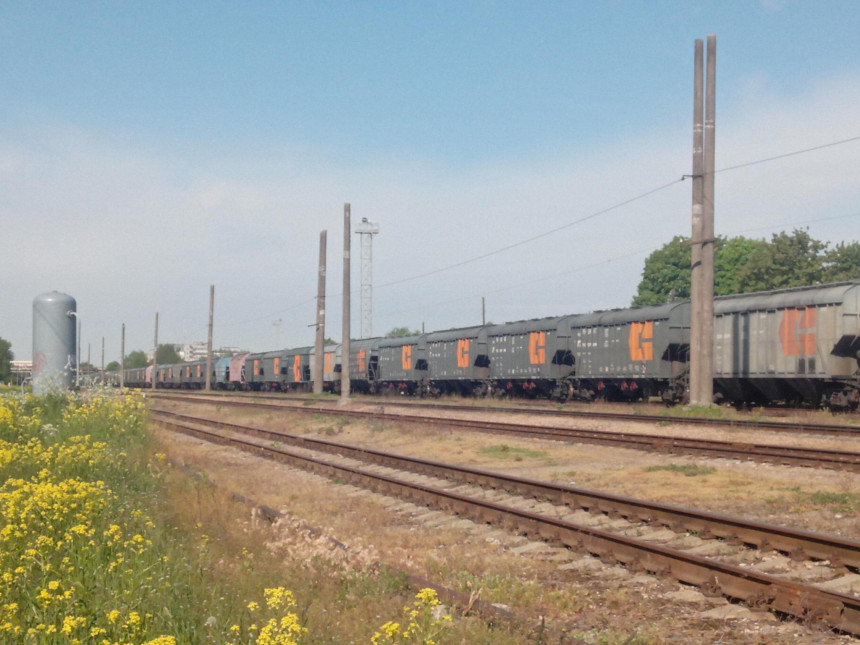Russian grain business is guarded by Africans even in Čiekurkalns

The Russian grain wagons parked at Čiekurkalns station are here quite legally and not just because the day after the sanctions were imposed the real beneficiary issued additional shares, formally reducing its stake in the company. Russian grain will not be touched by the United States or the European Union because the export of grain to poverty-stricken countries is seen as a humanitarian issue, not an economic one.
The grain transported by Russia is soaked in Ukrainian blood, not only figuratively, but also literally, as a significant amount of last year's grain harvest has been stolen by Russia and brought from Ukraine. However, no one in civilized Western society is standing in the way of these wagons and sending them home. It is believed that cutting off Russian grain exports will do even more harm to the world. Namely, the biggest market for Russian grain is Africa. If there is no grain, Africans will starve and the consequences will be twofold: some of the hungry will again go to prosperous Europe to eat in Berlin, while others will stay and start wars among themselves to take food away from those who still have it. And so the world turns a blind eye to the fact that it is indirectly supporting the war in Ukraine by allowing Russia to profit from the grain business.
Latvia also turns a blind eye
Neatkarīgā has already reported that "There are Russian grain wagons sitting at Čiekurkalns station." Two huge trains with the inscription ZERNO - grain - and the owner of most of them is the Russian company AO Русагротранс. Of course, to any supporter of Ukraine, this fact in itself seems wrong, but formally there is nothing to object to. Latvian Railways has checked the sanctions lists and informs that neither the company nor the type of cargo is subject to sanctions. Neatkarīgā dug a little deeper than Latvian Railways on the web and found that indirectly these Russian grain wagons are linked to the sanctions against Russia, but the real beneficiary has managed to legally circumvent them.
AO Русагротранс is part of Russia's largest grain exporter, Деметра-Холдинг. Before the sanctions, the Russian bank ВТБ/Внешторгбанк held a controlling stake of 50% plus one share in the holding company.
Because Africans want food
On February 25, i.e. the day after Russia re-invaded Ukraine, the sanctioned bank reduced its stake to 45% by issuing additional shares. So it no longer formally has a controlling stake in the grain company, and the wagons parked at Čiekurkalns station are therefore not considered to be the property of the sanctioned entity. Accordingly, as long as the other two co-owners of Rusagrotrans - Marathon Group and Granum - are not sanctioned, the grain wagons at Čiekurkalns station will formally have no connection with the war in Ukraine, even if the grain and its products stolen in Ukraine are found inside. Moreover, according to sources in the foreign policy circles, Russian grain will not be sanctioned by the US or the EU, no matter how bloody it may be. In Africa, people want to eat, but they cannot feed themselves. Feeding Africans keeps Africa at peace and protects Europe from migrant floods.
As for the Ukrainian grain that has not yet been stolen by Russia, efforts are ongoing to somehow get it out of the country - for export. The Black Sea ports are full of mines and clearing them would mean more risk for the Ukrainians. One option is to take the grain through Poland and on to Baltic ports. But the problem is the different track gauges. It is expensive and technically difficult to change the wagons back and forth. The other option is to negotiate a transit with Belarus, but this is not easy either, as the Ukrainians would then have to cooperate with the aggressor's supporter, and the Belarusians will demand that the ban on potash salt transiting the Baltic ports be lifted. Whichever way you choose, all of them will hurt but the Ukrainians, of course, will be hurt the most.
***
Comment by SJSC Latvian Railways:
We have checked the wagons shown in the pictures and concluded that the Russian company Rusagrotrans is not included in the national or international sanctions lists. The information at our disposal indicates that the goods in the cargo (according to the code nomenclature: rapeseed, oil and other solid residues from rapeseed or colza seeds with low erucic acid content) are not subject to sanctions restrictions. SJSC Latvian Railways as a state capital company strictly complies with the international and national sanctions legislation and does not allow any deviations from its requirements. We closely monitor whether the cargo transported or the related legal and natural persons are on international sanctions lists, and intensive work is carried out on a daily basis, analyzing business partners, clients and customers. Our customers are bound by these requirements. Similarly, any type of cargo and its entry into Latvia is controlled by the SRS Customs Administration in compliance with all internal and external regulations.